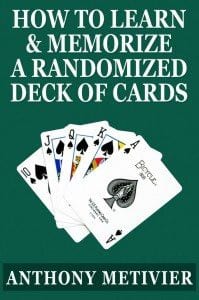Thu, 26 February 2015
It’s no secret and certainly no shame about it. People get depressed. Ain’t nothing new. Before depression, was melancholy. Some called it “deprimare” (Latin). Some called it “melas” (Greek). Manic comes from the “manikós” and “manía” (Greek) and means inclined to madness. Latin later turned the word into “mania.” The names may change, but the states remain the same.Mania and depression are the sorts of thing that can happen to anyone, at any time, for any reason … or for no reason at all. I hope these states never happen to you, dear Memorizers. But if they do, I highly recommend that you supplement your medical treatment with mnemonics. I’m not a doctor (at least not the medical kind), so I’m not qualified to offer medical advice. I can only tell you that when the black bile of melancholia hit me during my graduate studies, it hit hard, it hit bad and it did its best to sink my Magnetic ship into the rough seas of depression. Anyhow, the inspiration for today’s episode and sharing these memory improvement tips for students suffering from Manic Depression comes from a listener of the Magnetic Memory Method Podcast. He wrote: Thanks for sharing your story. I also have bipolar. It’s a tough thing to deal with and I appreciate your willingness to share your story. I have always wanted a doctorate degree. But for reasons you are well acquainted with, it has been a massive struggle. Another one of my life goals is to learn Russian and be fluent. I feel skeptical that the methods outlined here can help someone like me to accomplish these goals, but I’m willing to take a deep breath, and give it 100%. Honestly, what’s the worst that can happen? It either works or it doesn’t, right? I’m going to try hard to make this work, and I will be in touch to let you know how I’ve progressed, but for now I wanted to just thank you for bringing the possibility to me, and for sharing your struggle with bipolar. In today’s episode of the podcast, I address this letter in detail, giving you the reasons why you should feel the mania and depression and do it anyway. There is nothing that you cannot achieve just because you have this emotional dis-ease. Concentration Zen For Students With Brains Bipolar Medication Has Turned To MushI’ve talked several times before about my personal history with concentration issues, so you’re not alone. I was thrown into a severe depression as a grad student and that’s one of the things that led me to memorization techniques. And of course, no sooner than I emerged from the depression, I found myself riding back up to the sky. And it’s hard to focus when you’ve got the wind blowing hard in your face as you blast towards the moon. But even with memory techniques to guide me during these torrential states, they didn’t completely eliminate the concentration issues. One practice that I found helpful (though not always) was to read out loud. Narrating books can put strain on the voice and requires a lot of water, but it also helps generate focus during especially difficult passages. When narration wasn’t possible, I found audiobooks whenever I possibly could. This is usually easy for novels, but not so easy for dry theoretical texts – hence reading out loud. But the point is not to “read” the audiobooks while walking around or cooking bacon. For the purposes of serious study, you want to have the actual text in front of you and read along with. That’s why I always listened and read at the same time. And If I had to, I recited the book myself and then listened to my own narration while following along with the book in hand. How Memory Techniques Saved The Lovely Voice You Hear Today On The MMM PodcastNext, I studied memorization techniques (you knew that was coming). These are great because they sharpen the mind and improve concentration. I think it’s because practicing with Memory Palaces and related techniques sends more oxygen to the brain. It also helps improve recall (of course) because it’s a simple matter to store key points in a carefully prepared and predetermined Memory Palace. Along with memorization techniques, meditation is incredibly helpful for avoiding all of the 17 student fails I’ve talked about elsewhere on the Magnetic Memory Method Podcast.. Nothing fancy. Just sitting, breathing, watching your thoughts. 3-5 minutes is good, 10 minutes is very good and 15 minutes is exceptional (that’s a loose quote from a meditation training I heard once upon a time). Three 15 minute sessions a day works gangbusters for me. Then there’s the matter of diet and exercise. Sorry to spread the bad news, but eating processed foods and anything wrapped in plastic or bolted into a can is probably not going to help concentration. I’m not a doctor (well, I am, but not the medical kind) so I can’t give any dietary advice. But you know the drill. Eat well and keep fit. While You “Treat” Manic Depression With Memory Palaces … Look At What Else They Can Do …And then read these … Further Resources Memorizing Vocabulary Fights Depression Robin Williams And The Most Unusable Memory Palace In The World Dr. Jim Samuels on using mnemonics to relieve stress Before I go, don’t think that you have to have a mental illness to benefit from these memory tips. They’re good for anyone and everyone. The post Memory Improvement Tips For The Manic Depressive University Student appeared first on Magnetic Memory Method - How to Memorize With A Memory Palace.
Direct download: Memory_Improvement_Tips_For_The_Manic_Depressive_University_Student_Magnetic_Memory_Method_Podcast.mp3
Category:Podcast -- posted at: 11:28am EDT |
Wed, 18 February 2015
Plus, I want to show you a number of Memory Palaces created by Magnetic Memory Method readers and course participants. Incredible Images That Show You Exactly How You Can Build Your Own Rome Of Memory In A Single Day!So read every word on this page, watch each and every video from beginning to end and listen to the entire podcast. First up … A Killer Resource For Becoming A SuperHuman! Not so long ago, I interviewed the great Jonathan Levi, a fellow instructor over at Udemy and now podcaster extraordinaire. He interviewed me in an hour long session that covers all kinds of memory topics that you’re going to want to listen to right away and then subscribe to the Becoming Superhuman Podcast. What you’ll learn in this special Magnetic Memory Method interview includes: * How to reduce stress with mnemonics … * Fundamental principles of memory and how I improve my memory every day … * How to increase memory power simply by understanding what noripinephrine is … and then acting according to its whims! … * Memory improvement tips for overcoming the “primacy effect” like a sabre-toothed tiger glides through the jungles of forgetfulness … * How to improve short term memory by understanding the Method of Loci and creating top-notch, bulletproof and 100% Magnetic Memory Palaces … * … and much, much more! Next up … The Unbelievable Secret To Getting Free Donuts While You Relieve Boredom At Work And Get Really, Really Fat!It was just another Magnetic day here at the Magnetic Memory Method headquarters until I opened my email and a subject line leapt out at me … Thanks for the Donuts! And so I asked myself … What manner of spam chicanery is this? No chicanery at all. Check it out! Good Morning Anthony! I am emailing to thank you for the donuts. As a fun activity and to help take our minds off of work, I made a wager with my fellow office coworkers that I could memorize – verbatim – a chart of makes, submakes, model numbers and letters, RV types, sub-types, and the 2-digit VIN identifier of 83 RVs as produced by our company. Again, this was for fun and by no means a testament to memorizing things “verbatim.” If I lost, I would buy the office donuts. If I won, the office would by donuts and I could have as many as would be considered gluttonous. Though this apparently seemed to them a silly bet that I could never win, I did warn the office that I was quite confident in my ability to do this. So, after a 2-week study window and a 20-question “test” (plus many shouts of random VIN IDs from the non-believers) I received enough donuts to move my belt out a notch. Again, !!THANKS!! For the donuts and I’m sure you will be happy to know I passed your information out to everyone as a gift for their participation. Sincerely, Matt Simon And because this email comes with an amazing graph of what Matt memorized … I made a video for you so you can see it! Next up … A Memory Palace Made Of BEAR MACE!Okay, not really, but check this Memory Palace sent to us by the amazing actor Matt Newby who has a hilarious produce spoof over at Famousoldie.com. He writes: Hey Anthony! Wanted to share with you some things! First when I started keeping a memory journal I found myself not wanting to open it because well I guess it just looked boring to me … nothing to exciting about a green composition book. So I printed out of retro futuristic designs and things this resulting in Now I want to open it! Second I’ve been doing cards using the Person Action Object method and an 18 room Memory Palace I built in Minecraft. Between Dec when it started and today I’ve done it 17 times with an average time memorized 12min and an average time recalled 9min missing about 4 on average. I feel like I’ve hit an “OK plateau”. Do you think I haven’t done it enough times to feel that way yet? I’ve done a lot of work with the PAO method. I got your book last night about cards and I feel like I’ve done so much work with the PAO I don’t want to switch methods just yet. I did however love the idea of breaking it down into 4 sets good way to make it seem easier! I will get this down to 1 minute! Do you have any drills I could do? Should I try other methods? You da main man with da plan! Matt PS I’m an actor I loved your last podcast! Having come this far, I thought … Why Not Show You Some More Amazing Memory Palaces Created By People Just Like You?Why not, indeed? Here’s one by a young person in grade school sent to me by her teacher (with the permission of the parents, of course). Here’s another presented by a Magnetic Memory Method course participant down in Australia: And to close off this episode of the Magnetic Memory Method Podcast, let’s look inside one of my very own Memory Palaces! So, I hope you enjoyed this episode. But even if you hated it … what are you waiting for? Get out there and build some Memory Palaces so that you can memorize anything you please! Further Resources Mentioned In The Podcast Jonathan Levi talks about Becoming A Superlearner. My take on the Person Action Object method … and serial killers! Tap the Mind Of A Ten Year-Old Memory Palace Master for more information on using Minecraft as a Memory Palace generator. Magnetic Memory Method Interview with Marc Shannon who talks about How to Remember Anything. The Magnetic Memory Method Masterclass. Method of Loci article on Wikipedia. The post Improve My Memory And Get Free Donuts! appeared first on Magnetic Memory Method - How to Memorize With A Memory Palace.
Direct download: Improve_My_Memory_And_Get_Free_Donuts_Magnetic_Memory_Method_Podcast.mp3
Category:Podcast -- posted at: 2:53pm EDT |
Thu, 12 February 2015
It’s okay. You can admit it. Your years in the traditional educational system were painful and boring, weren’t they? But even though you may have hated wasting all those hours away, I’ll bet you also wished that you had learned more. It’s a terrible irony, and yet you’re not to blame. And neither is your memory. Although there will always be problems with state education, just imagine what it would be like if learning could always be fun and interesting and that young people could remember everything they learn. Wouldn’t that be cool? Get Ready For The Good News About Memory Improvement Techniques For KidsIn this episode of the Magnetic Memory Method Podcast, Imogen Aires and her father Kevin talk about the powerful role memory techniques have played in her life as a young student. Even in a short period of time, Imogen has used a Memory Palace based on her school and another based on the home of a relative to memorize the names of royalty and the titles of Shakespeare’s plays. But the amazement doesn’t end with memory pyrotechnics. Kevin tells us about his surprise when he found that these memory stunts had an unexpected side effect: Getting Imogen – and the rest of the family – interested in the history of kings and queens. Even better, soon Imogen was reading abridged editions of Shakespeare’s plays. Kevin talks more about this in his recent TEDTalk: Tune into this episode of the Magnetic Memory Method Podcast and you’ll also hear about: * One of the best books for helping kids learn memory techniques (and adults too). * Why kids are perfectly capable of using memory techniques … and how this can lead to incredible “fluency” in Shakespeare’s plays. * How you can help your kids build and use a Memory Palace. * Why Imogen thinks that memorizing a deck of cards is going to be fun, even if they aren’t a huge priority for success in other areas. * Why Imogen finds that exercising her memory is anything but boring. Kind of like how Kevin Richardson turned his memory into the perfect Learn Japanese App. * Exactly why the mnemonic images you create need to be funny and weird so that they “stick” in your brain. * The kinds of information that kids find the most interesting to memorize and why. * How using memory techniques can serve as a “gateway drug” for developing interest in education. * Why kids have more than enough locations in mind in order to build many Memory Palaces, including schools they no longer attend. * The one thing that everyone has that makes creating your first Memory Palace incredibly easy and fun. * How you can practice what you’ve memorized simply by talking with other people by teaching them these incredible techniques. * How Imogen’s father turned what he thought would be a simple party trick into a moving TEDTalk about teaching memory techniques to young people. * Kevin’s “edge-ucation” concept and how to apply it to your exploration of memory techniques and any subject of interest. * Why mnemonic associative-images are like theatre plays and how that “restaging” them is the best path to getting the most out of your Memory Palace (and Memory Palaces if you’re using more than one). * Why you’re never too young and it’s never too soon to become a “memory consultant.” * … and much, much more. Further Resources Brad Zupp on Memory Techniques And Memory Improvement For All Ages 3 Powerful Memory Training Techniques From Around The World Remember, Remember: Learn the Stuff You Never Thought You Could by Ed Cooke The Memory Palace by Lewis Smile Tap The Mind Of A Ten Year-old Memory Palace Master on the Magnetic Memory Method Podcast The post Memory Improvement Techniques For Kids appeared first on Magnetic Memory Method - How to Memorize With A Memory Palace.
Direct download: Memory_Improvement_Techniques_For_Kids_Magnetic_Memory_Method_Podcast.mp3
Category:Memory Improvement Case Studies -- posted at: 2:19pm EDT |
Wed, 4 February 2015
Even if you’re not an actor, you’ve probably wondered what it would be like to get up on stage and completely forget your lines. Or maybe you’ve just asked yourself what that would feel like … To go completely blank in front of a crowd. It does happen, even to the best. For example, Matthew Broderick once had to call for his lines many times during a play. In this case, it was due to multiple dialog changes shortly before the performance. But just imagine the pressure one tiny slip up must bring! And think of how much energy it must take to hold all those lines in the mind, sometimes for months if it’s for a play. It must be mentally and physically draining. Unless of course you’ve got top-notch memory techniques. Doing my research, I was quite surprised by the range of activities actors use. And yet not all actors use straight-up mnemonics, making each of these memory tips interesting in their own right. 1. Don’t Memorize Your LinesSounds weird, right? After all, Peter O’Toole famously said that he and most of his colleagues get paid to memorize lines. The acting they do for free. But many actors forgo memorization, at least at first. Instead, they read their scripts again and again. Anthony Hopkins, for example, talks about reading his scripts several hundred times. But if they’re not memorizing the lines, why all the repetition? It’s because they’re looking for intentions. Motivations and the emotional experiences their characters go through. As we know from mnemonics, emotions are very memorable and build a lot of connections. And if you think about it, the most memorable scenes from movies all feature hugely exaggerated reactions based on emotional states. In sum, all of this repetitive reading builds associations at a microscopic level. The smallest detail in the dialog can make the lines much more memorable to the emotional being of the actor who must react from feeling just as much as from memory. And it’s the smallest twitch of a facial muscle that can make the difference between a blockbuster flop and an Oscar-winning movie. 2. Use Location and MovementActing takes place in time and space. It is an art of change, and as Plato and Aristotle pointed out about memory, change is always movement. And just as actors link their lines to emotional states, they also link them to movement. Knowing where a character says something, in which emotional condition and in response to what context all provide powerful cues. This cool technique resembles Memory Palace work in many ways. But instead of using a familiar home as a Memory Palace, the film set or theater stage becomes a specific-purpose Memory Palace designed to accomplish a specific task. Both Mark Channon and Scott Gosnell have talked about different ways of making Memory Palaces like this on the Magnetic Memory Method Podcast before. As an actor himself, Channon has used the technique just described. And Scott told us about going to an examination room before you take a test to install your imagery. This “immersion” technique works extraordinarily well because you’ve got a real representation of your Memory Palace in front of you. This immediacy lets you focus on the memory triggering power of your associative-imagery with great immediacy. And if you’re an actor or want to perform well on an exam, you need immediacy. In fact, you need the target material to leap into your mind like mice on cheese in a world free from cats and barriers. 3. Focus on EmotionsWe’ve already talked about emotions in the first part about mentally processing the lines of a play again and again. The idea here is that the more you read the lines, the more dimensions of the character in the context of their narrative world you’ll understand. But the actor also needs to feel those emotions at a legitimate level. And theoretically, by making oneself feel the emotions in a genuine way, the lines should be more memorable. And if you think about it, you’ve probably had more than one experience in your life where you could remember parts of an argument word for word. Maybe you’ve experienced arguments so intense that you can still remember things you’ve heard and said. And it’s this power of supercharged emotions that actors use to help them remember their lines. They hunt for that same spike in feeling in real life that people use to win arguments and memorizers use to make information more memorable. Those are the three main ways actors remember their lines and they can all add something to your practice as a memorizer. And you don’t have to go to your high school or college examination room to get results with real location projection. Try using your home as a Memory Palace sometime. Take lyrics from a song or a poem and stand at or beside or on a station. Create associative-imagery for the first line and with eyes both open and closed, burn that imagery into place. Do this with a couple of lines, physically moving from station to station. Then, looking back, see or reconstruct your associative-imagery using words and decode it. If you like, go back to the station itself and put some motion into your “act of recall.” If you’ve struggled with decoding associative-imagery before, this simple exercise in acting may be the breakthrough you need. Other Ways Actors Have Memorized Their LinesSince we’re here, let’s look at some other ways actors have “memorized” their lines. This part of the post is just for fun, so don’t try any of the following when the stakes are high like during an exam for school or professional certification. You could wind up failing your exam or even getting kicked out of school. 4. Don’t Memorize Anything At AllThis tip for improving your memory is not going to help much, but it is a tribute to the talent of many film and television actors. They simply show up and have their lines fed to them, one at a time. Remember when we talked about using the set of Deadwood a little while ago as a Memory Palace? Well, go ahead and use it to practice virtual Memory Palaces and recalling information, but rest assured of this. Although the actors on Deadwood certainly prepared by memorizing their lines, rarely did they deliver them as scripted. Why? Because the creator of the series, David Milch, changed the lines up to the last minute, including during the shooting of Deadwood. To deal with these changes, actors would assume their places and call “line” in order to be told by someone off-camera what to say. And then they would repeat the line, and their call for help would later be edited out of the footage during post-production. Knowing this behind-the-scenes fact about Deadwood certainly has increased my appreciation for how well those actors managed to stay in character. How about you? 5. Scatter Your Notes Around The SetIt was pretty awesome having Marlon Brando play Superman’s dad back in the Richard Donner film, wasn’t it? But it seems that the much-adored thespian was either lazy or Super-forgetful because, in this bit of film history, he insisted on having his lines on pieces of paper scattered around the set. The people who worked with him were not pleased by his lack of professionalism. Yet, when you watch the film, he certainly does a great job of playing the father of one of the greatest superheroes ever invented. And keep in mind that reciting from a script does not equal bad writing. Cartoon narrators do it all the time and no one criticizes them for that. Still, it’s kind of a weird feeling to think that Brando couldn’t be bothered to memorize his lines in this film. But I’m sure most fans will forget this fact and forgive him. 6. Use An App In Place Of An AssistantThere’s an app that looks interesting called Rehearser. It’s only available for Andriod, so I haven’t been able to assess it, but the idea is that you can import a script and it will feed you the lines that go before yours. These prompts train you to respond without needing an acting partner or a coach. Throw a dedicated Memory Palace strategy into the mix and you’re golden. 7. Let The Gods Of Acting Pump The Lines Invisibly Into Your EarAngela Lansbury will likely never be forgotten for her role as the star of Murder She Wrote. Yet, as age has taken its hold, and she’s boldly refused retirement (and apparently the Magnetic Memory Method), memorizing her lines has become increasingly difficult. http://youtu.be/g7s8NWAqVS8 Her solution when acting from the stage? She wears an invisible earpiece that lets someone offstage feed the lines to her when the going gets tough. Now You May Be Wondering …Is there a way for an actor who needs radio controlled prompting to make improvements, regardless of age or present mental condition? Of course there are ways. Lots of them. I would probably begin with some basic training in the correct construction of Memory Palaces. People who fail to have success with them usually haven’t had exposure to the finer details, which is why I created the Magnetic Memory Method Masterclass. Following that, I would add a few simple memory drills. Memorizing a deck of cards would be one of them. Purely for strengthening visual association skills, it’s a great exercise. It’s also a memory exercise that paves the way for memorizing increasingly abstract words and phrases with greater speed and accuracy.
But were I to coach an actor with memory issues, I would soon add a simple drill we’ve talked about before: Memorizing using dice. Starting with just one die and a poem or longer speech from a play, I would have the actor roll and come up with a number. Whatever number comes up, that’s how many lines she or he will memorize. For example, take one of Adriana’s speeches in Shakespeare’s The Comedy of Errors. If the actor rolled a one, then we would work on memorizing one line on one station. If the actor rolled a five, then we would go for five lines. I would them send the actor home and let them roll that die a couple times a day for a week with the goal of having as many lines as possible memorized. Then, when they show up for the next coaching session, we would roll again. Except this time, if they rolled a three, they would need to recite three lines starting from the third station. If they rolled a six, it would be six lines from the sixth station or six lines backwards if the actor had reached the end of the memorized material. From that point onward, we would add more dice every week. And you can use this memory tip for anything. If you’re working on a foreign language, roll the dice and memorize as many words as the number indicates. Then, use the dice to recall as many words as the dice indicate. Giving yourself a sort pattern like this is the mental equivalent of working out in a gym with skipping rope. Just Do ItAs I’ve hoped to show, actors use many different ways to memorize their lines, and we can take some tips from them to improve our memory abilities when using memory techniques. So what are you going to do with this information? Let it sit like an unproduced play collecting dust on a shelf? I hope not! Get out there and put these ideas to use because taking action by staging a play in the gym of your mind is the only way to get results. And these fun and games? They’ll make your memory Magnetic. Further ResourcesMagnetic Memory Method Podcast Episode on How to Increase Memory By Watching Movies And TV Series Magnetic Memory Method Podcast Episode on using dice to memorize. Superman info on IMDB. Check it out! The post Memory Tips From Actors Who Don’t Clown Around appeared first on Magnetic Memory Method - How to Memorize With A Memory Palace.
Direct download: Memory_Tips_From_Actors_Who_Dont_Clown_Around.mp3
Category:Podcast -- posted at: 9:25am EDT |
The Magnetic Memory Method Podcast

Categories
generalMemory Improvement Tools
Memory Method Tips
Brain Exercises for Memory Improvement
Memory Improvement Case Studies
Podcast
Guest Post
Memory Palace Tactics
Practical Memory Techniques
Uncategorized
Improve Memory Q&A
Archives
AprilMarch
February
January
December
November
October
September
August
July
June
May
April
March
February
January
December
November
October
September
August
July
June
May
April
March
February
January
December
November
October
September
August
July
June
May
April
March
February
January
December
November
October
September
August
July
June
May
April
March
February
January
December
November
October
September
August
June
May
April
March
February
January
December
November
October
September
August
July
June
May
April
March
February
January
December
November
October
September
August
July
June
May
April
March
February
January
December
November
October
September
August
July
June
May
April
March
February
January
December
November
October
September
August
July
June
May
April
March
February
January
December
November
October
September
August
July
June
May
April
March
February
January
December
November
September
| S | M | T | W | T | F | S |
|---|---|---|---|---|---|---|
| 1 | 2 | 3 | 4 | 5 | 6 | 7 |
| 8 | 9 | 10 | 11 | 12 | 13 | 14 |
| 15 | 16 | 17 | 18 | 19 | 20 | 21 |
| 22 | 23 | 24 | 25 | 26 | 27 | 28 |
Syndication



 In this episode of the Magnetic Memory Method Podcast, you’ll learn about how to get fat off of all the free donuts you can stuff in your Magnetic little belly (or big belly as the case soon shall be …)
In this episode of the Magnetic Memory Method Podcast, you’ll learn about how to get fat off of all the free donuts you can stuff in your Magnetic little belly (or big belly as the case soon shall be …)



